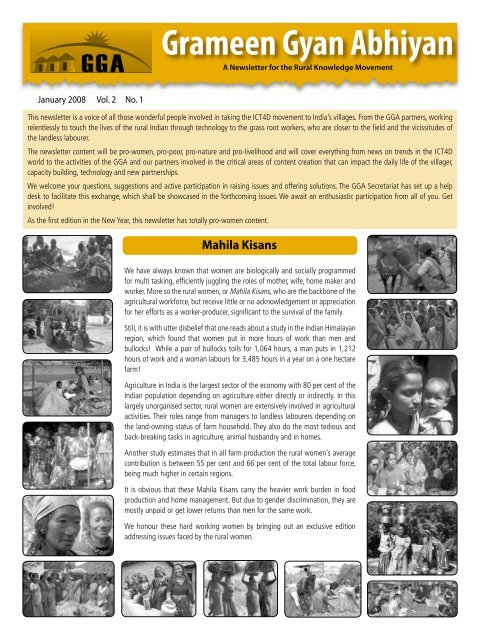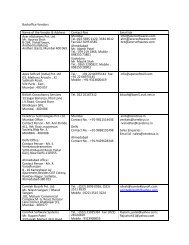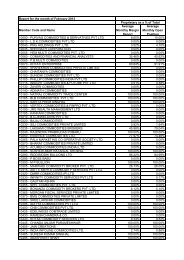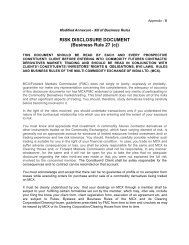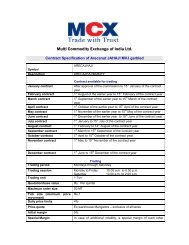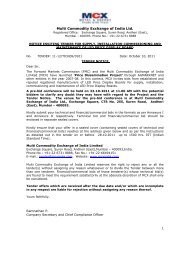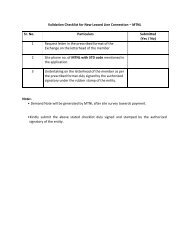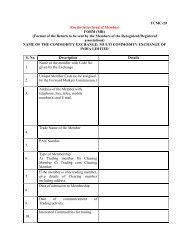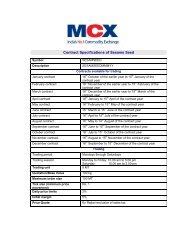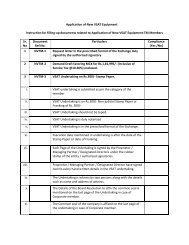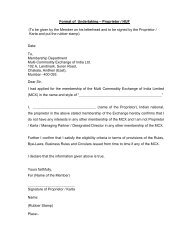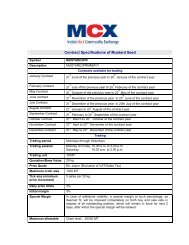You also want an ePaper? Increase the reach of your titles
YUMPU automatically turns print PDFs into web optimized ePapers that Google loves.
The Power of OneTribal Woman Armed With NVAFellowship Takes On OfficialsThis is the story of Ms. Chinnalu Kandagiri, a 43 year old, uneducatedtribal woman from the mountainous Rayagada district of Orissa whosestruggles have secured an identity for her people, a road to her villagewith solar street lamps, schools for the children and power supply.Her people, 54 families belonging to the Dongria Kondha tribe, aretraditionally fruit farmers or horticulturists and practised shiftingcultivation also called slash and burn cultivation or Podu on the hills,which made them nomadic. Moving from one place to another, theywould set up makeshift shelters and had no regular system of educationfor their children or health facilities. Until Ms. Chinnalu stepped in andassumed leadership.This small diminutive woman, wearing a sari and a gentle smile doesnot look like the stuff leaders are made of, until one notes the intensedetermination in her eyes which brook no obstacle to her progress.Educated up to class three, through adult literacy programs, she hasdeterminedly learnt two languages, Oriya and Telegu, to serve herinterests. The tribe speaks a distinctive language, ‘Kui,’ which has nowritten script.With Oriya, she succeeded in breaking the language barrier between hertribe and the neighbouring villagers. Through her contacts with otherwomen, she changed attitudes and generated the good will that allowedher tribe to set up and settle down in the village of Gunupur in Rayagadadistrict. This way, she succeeded in anchoring her complete group of 54families from a nomadic to a settled lifestyle.Rayagada is a district of Orissa, which has 16 per cent of land underthe reserved forest area. There are about 62 tribes in Orissa ofwhich the most ancient group are the Kondhas (they are one of thedeclared 13 primitive tribes of India) who inhabit the plateaus of theNiyamgiri hill ranges which encircle the areas of Rayagada, Koraputand Kalahandi districts.“As a child, I never had the opportunity to go to school. I wanted to learnand I wanted every child to be educated. This was only possible if wecould stay on and work in one place,” she says.Once settled, for a livelihood, she and her group of women began tocultivate paddy in leased farms in the neighbouring villages. But the annualshare of the yield was not sufficient to meet basic needs throughout theyear, and therefore, their families needed to work on daily wages.Her struggle to make ends meet made her tap her group’s latent talentas horticulturists. She went to the Forest Department who had land thatneeded to be developed into a nursery. She motivated her group of threeactive Women’s self help groups (SHG) in the village to work in thenursery. In the first year itself, they earned a profit of about Rs. 69,000,by developing a teak and herbals nursery. Under her dynamic leadership,three women SHGs were formed into a federation. Ms. Chinnalu is thespokesperson of this team and represents the problems of the federationand her village to demand justice and action for a better life.The Jamsetji Tata National Virtual Academy (NVA) recognised herleadership and honoured her commitment with a NVA Fellowship of thegrassroot academicians in August 2006.Armed with a Fellowship, and increased confidence, Ms Chinnalusucceeded in anchoring more than five tribal groups similar to hers, intothe neighbouring areas within a radius of 50 to 60 kilometres. This hasbrought her appreciation and fame, which she has used positively for thebetterment of her cluster of villages.“Wearing the convocation scarf while meeting the government officialshelps me to make them take my words seriously,” she says.She has managed to obtain a grant of Rs. 50,000 from the stategovernment to maintain a community centric poultry in her village.With the help of SHGs she has managed to raise kitchen gardens neartheir homes. She has also motivated more women to work in the SHGs,taking the number from 12 women to 50 women, which has led to anincrease in profits close to Rs. 1,50,000, that was deposited with thelocal cooperative bank. This has led to an increase in the income of thesewomen thereby allowing them the luxury of finding more time for theirchildren rather than taking up extra labour jobs.Much wants more. Ms Chinnalu then started canvassing for what shebelieved was their right. She started a struggle for a tarred approachroad to her village. Although, this is yet to be done, her village has beenproperly defined. This means, it would now be eligible for basic facilities.Ms Chinnalu has also successfully got the support of the local governmentofficials for getting a balwadi and then an aanganwadi school constructednear her habitation, which provides midday meals and a primary educationfor the tribal children in the area. Today there are about five children fromher village going to the secondary school in Rayagada.As her village achieved a name, doctors from the government hospitalstarted to visit regularly providing some modicum of health consultancyto he people.A public distribution system outlet has yet to reach her village. But shehas managed to get a storehouse constructed for stocking their share ofthe oil and food grains from the neighbouring PDS centre.She has convinced government officers to provide a solar street lamp toher village and make electricity reach the common points of the village.
She has empowered her community andeven got the tribal group to commonlycare and provide for the orphan childrenwhose parents are dead.Obviously, people love her. But there isa downside too. The men and husbandsare polygamous, excessively consumemahua and handia and do not go towork. As they are not available, they arenot offered the labour on governmentcontracts which is Rs. 35 per day.Neither do they get the private contractsat Rs. 45 per day. The men do not work,do not earn regularly, take money fromtheir wives, drink and watch movies inRayagada town, living off the woman’sincome. Women thus maintain theirhusband, the house, which is in thehusband’s name but paid for throughtheir income, plough and reap thefields, look after the kids and the poultrythrough their labour of love.Yet, there is not even appreciation.Only wife beating, which is common.Ms. Chinnalu’s life is no different. Herhusband is typically like the other menin the tribe. Lately, he has not been ableto accept his wife’s popularity amongthe people who regularly visit her withtheir problems. In fact, along withother men, he tried to foil her attemptto contest and win the Panchayat wardelections.But Ms. Chinnalu is determined.The reach of electricity, PDS store,the Solar street lamp and the road(We thank WFP, our GGA partner, who through the Forest department hasencouraged Ms Chinnalu Kandagiri and her tribal group. Mr. RajinikanthRaut WFP field Unit Range Officer, Mr. Jagdish Prasad Das DistrictCoordinator UNWFP for Districts of Kalahandi and Rayagada helped usto profile the impact of NVA fellowship.)A Warm Welcome to a New PartnerGender Training Institute joins the GGA NetworkPolice Training Schools in Delhi and Chandigarh have adopted simple,participatory training tools to inculcate gender sensitisation within thepolice structure.Workshops for IPS officers offered them an opportunity to shelvetheir preconceptions and inaccuracies about gender through open,intense discussions on human trafficking, violence against women andcounselling.There is change in India, slow but steady on gender perceptions andgender inequality that is impacting policy making from the Panchayatto Parliament. Organisations like the Gender Training Institute (GTI) areworking hard to build inroads into decision making institutions.The Gender Training InstituteThe Gender Training Institute (GTI), set up by the Centre for SocialResearch, with support from the European Union in 1997, seeks thevision of an equitable society where women are aware of their rights, donot succumb quietly as victims of violence and gender justice is realised.Its mission is to build the capacities of women and men, restructuringrelationships towards achieving gender equality through training,consultation, research and information.The institute seeks to build inroads into policy making institutions forthe development of an equitable society that ensures empowerment ofwomen. The Institute believes that each of us is a decision maker and acatalyst for change and a potential participant in GTI programmes.The trainings are grounded in existing societal situations and participantsanalyse the reality and search for solutions that change and correct thegender imbalance. The institute began modestly with five trainings and170 participants in the year 1997 and within a span of six years it hasconducted 236 trainings and reached out to nearly 7884 participantsacross the country.The Institute believes that such training is not an end in itself, but partof a larger process of learning and change. GTI hopes to equip membersof society to achieve empowerment through a change in relationshipsbetween men and women from household decision-making to nationalpolicy.The GTI team believes that everyone can benefit from gender sensitisationtraining. “It helps us to question some of the most embedded andfundamental assumptions we have about the world around us. Even themost socially aware can still be surprised by the impact of their genderedperceptions.”Some of the training modules the Institute conducts are the following:Training of Gender TrainersFor institute managers, project managers, potential trainers, humanresource managers, NGO’s, funding organizations and those interestedin gender issues.Capacity Building in GovernanceFor elected representatives of Panchayats and Urban local bodies.Gender Integration in ProjectsFor individuals who work in different sectors of development, in NGOs,government departments and international agencies.Synergizing Gender in EducationFor teachers and students.Gender Sensitization for Law Enforcing AgenciesFor police, constables to IPS officers, Customs and Excise officers, IRSofficers, lawyers and personnel in the forest department including IFSofficers.Integrating Gender in Corporate Decision MakingFor human resource professionals, development and training personnel,industrial relations and administration managers.This Institute can be contacted through Ms. Anju Pandey, Gender TrainingInstitute 2, Nelson Mandela Marg,Vasant Kunj, New Delhi 110070,Phone : 26899998 Email : info@csrindia.org, anju@csrindia.org
She Needs HelpSixty years after Independence, it is worth reflecting on the thought thatwomen are the backbone of the nation’s economy as a whole, especiallyin rural India. Studies have shown that women work nearly five hoursmore than men, averaging 14 hours and nine hours respectively. Time usestudies in six major States show that womenoverall enjoy only five minutes leisure a day,while for men the figure is two hours a day, andthat women sleep two hours less than men.Here is a challenge to our Science andTechnology institutions — to develop lowcost,appropriate technology to specifically address the issue of reductionof drudgery and burdensome labour in the so-called “domestic”domain, based on local resources, and combining traditional skills withenvironmental and health concerns. Is this not as inspiring a vision or asexciting a task as developing rockets to go to the stars or instruments tokill other human beings?A few innovative institutions in the country are already developingsuch technologies — now it needs to be taken up in the mainstream,sponsored by the Government and carried with the help of media to thecountryside, especially the most needy and remote areas,By Mrs. Mina Swaminathan, Advisor, MSSRFTelecentre on WheelsGGA Partner, ‘Change Initiative’ Works To Better TheLives Of Rural WomenA mobile solar powered tricycle, equipped with power panels, laptopsand printers travels from one village to another and through this mobileICT, helps the communities to sell their products, access information onhealth, education, agriculture, human rights and law in the local languageand at their doorstep. Villagers learn of local employment opportunities,fertiliser information, and can even post queries about any crop diseaseor soil problems on certain forum for solutions.This is the Telecentreon Wheels (ToW), anexperimental project of therural NGO, Change Initiatives,launched in November 2007,with the support of UNESCOand WBREDA (WestBengal Renewable EnergyDevelopment Agency). It covers 4 villages: Ghoragacha,Madandanga,Kantabelia and Teligacha in West Bengal’s Nadia district.Selected villagers from the community are given training in basiccomputing and they then train e-literate volunteers who can help thevillagers access the information they need. This initiative also enables adigital archive of local content on issues concerning women, youth and‘Several interventions are needed to improve livesof women and girl child’ The Union Minister ofState for Women and Child Welfare Smt. RenukaChoudhary has therefore proposed an outlay ofRs.72,000 crore for women and child welfare inthe 11th Plan.rural livelihoods that is relevantto villagers.Change Initiatives is workingwith rural communities in thefield of ICT for developmentin the Indian state of WestBengal for the past 5 years.In the remote areas of Indiadue to lack of communication,electricity and connectivity, people cannot access ICTs even if they aremade available. As a first step, Change Initiatives started using laptopsin two villages, Ghoragacha and Madandanga, on a regular basis, todisseminate information in the initial stages of the TeleSupport Project.Taking the process forward, it was decided to develop a mobile van thatwould travel from one village to another with the laptop computer tobring pace to the work and provide more accessibility. But the problem ofelectricity remained unresolved. Internet connectivity was another majorobstacle.In mid-2007, Change Initiatives came in contact with WBREDA whichhad developed a solar-rickshaw van for selling diesel in villages. Solarpower is required to measure the diesel outflow. This solar van opened anavenue for mobile telecentres. Carrying the idea forward, it was possibleto take ICT tools to the village, without any dependence on local poweravailability.With the support of UNESCO and WBREDA, the Telecentre on Wheelswas finally launched on 6th November 2007.TOW also aims to develop a financially sustainable model from the verybeginning of its operation by providing few IT enabled services such asdigital photography, print out of forms, basic DTP work. It will also enablethe sale of local produce of women SHGs.This is however, just a beginning. Change Initiatives is now looking forinternet solutions as well as low-cost alternatives for the laptop computerto widen the scope of the network area.Ms. Jhulan Ghose and Ms. Sanghamitra Majumdar are the ProgrammeCoordinators with Change Initiative.Voice Of The PeopleSANGHAM FM Radio Run by Women in APDeccan Development Society, a grassroots organisation in Telangana,Andhra Pradesh and a GGA partner, has initiated Sangham FM, the firstcommunity radio to be launched in the country.Sangham FM made waves in Andhra Pradesh by catering to the needsof people in their local dialect by narrowcasting news capsules, relevantto the community, in the nearby villages on specific days. Villagers werehappy and eager consumers of information on issues such as biodiversityand seed sovereignty. Says Himmat Rao, a villager, “Now I can receiveinformation specific to certain crops like millets and other minor grain,central to our food security and dietary requirements, which had beenmarginalised.”Following the popularity, Deccan Development Society, that works withsangams or village level groups of rural poor women most of who areDalits, set up Community Media Trust, a separate group established to
We are living in an age where human knowledge, particularly scientific and technological knowledge, is increasing at anunprecedented pace. Access to this knowledge has become a principal determinant of the power and wealth of nations.India has to harness the full potential of modern science and technology to realize our development ambitions.Dr. Manmohan Singh Hon’ble Prime Minister of India addressing the 95th Indian Science Congressrun the community radio station at Pastapur in Madak district in thebackward Telegana region in AP. This FM radio station shall be managedby Dalits, mostlywomen. It recentlygot the communityradio license fromthe Ministry ofInformation andBroadcasting forthe station to goon air. Community radio has a radius of 10 kilometres.Radio is a natural medium for these women who have extraordinarynarrative skills. Most of them are illiterate but resourceful and theyalready have ready content for more than 600 hours.They have recorded programs on topics like empowerment of women,local problems relating to health, indigenous knowledge and traditions.They invite the impoverished individuals and community people to singfolk songs many of which relate to the unbelievable cropping diversityand agrarian questions in the region.The poor Dalit women, have their own expectations from a radio of theirown. Their arguments are extraordinarily original and unmatched for theirlogic. They have suggested that a radio of their own would provide amore effective medium for articulating locally relevant issues, in their ownlanguage, and in their own time.The community video and radio also focus on an alternative to literacythroughharnessing people’s knowledge in the fields of forestry, fisheries, naturalfarming, wasteland development, on-farm biodiversity natural resourcemanagement, etc.With the linkage of more villages, experts point out that the availablespectrum can accommodate 100 to 200 community FM stations in thenext five years. Community radiosare eligible to seek funding frommultilateral aid agencies.The Deccan DevelopmentSociety, started the communityradio to take forward its vision ofconsolidating village groups intovibrant organs of primary localgovernance and federate them into a strong pressure lobby for women,poor and Dalits. The Society also facilitates a host of continuing dialoguesand debates with the public, educational and training programmes to tryto translate this vision into reality.Mr. P V Satheesh Director, Deccan Development Society, Sangham Radio,Pastapur Village, Zaheerabad Mandal, Medak District - 502 220 AndhraPradesh, ddsrural@sancharnet.inMEET YOUR MPSrimathi RANJEET RANJANSrimathi Ranjeet Ranjan, a sports woman, is one of the youngest Memberof Parliament from one of the least enviable Indian constituency ofSaharsa, Bihar, close to the Nepal border.This land, on the banks of the Kosi river,is fertile but prone to annual flooding thathas led to soil erosion and is the majorreason for poor connectivity of the area asbridges get washed away. Her people areamong the poorest in the country facingproblems of infrastructure, power, healthand education besides major corruption.Taking up their cause, Srimathi Ranjeet Ranjan has raised the maximumnumber of questions in Parliament. She believes politics translates tosocial work. She is eager to introduce much needed changes through ICTin her constituency.What is your mission as MP?For me, politics translates to social work. That is my mission as long as Iam an MP.What are your primary concerns for yourconstituency?Our people are poor. For instance, we have a lot of projects and schemesfor rural development from the government. But people are not aware ofthese projects. The poor people are not aware of more than 50 per centof the schemes. The schemes do not reach the people for whom they aremeant.For instance, the government has a scheme whereby a pregnant womanis to be paid Rs. 1400 if she gets the delivery done in a governmenthealth centre. For them, this is a big amount. More than 50 per cent ofthe women do not know this.The philosophy underlying the development of a knowledge based society is that science and technology should providebasic human needs. In other words, there is a “social contract of science and technology”When science moves close to society, it not only contributes to explosion of knowledge but also to the shaping of the socialvision.Dr. R. Ramamurthi Rallapalli, General President Indian Science Congress addressing the 95th Indian Science Congress
I have therefore said stop! We do not want any new yojanas or schemes,we first want to reach what we have to the people. One of my missions isto help the people become aware of all the government welfare projectsand schemes that can benefit them. So, whenever I hold a meeting I try tomake the people aware of their rights.What have you done to meet these challenges?What are your achievements?In my constituency, I have achieved rail connectivity for my people.When I became MP, there was no broad gauge rail line. We have alreadyintroduced seven to eight trains and are planning a double railway linefor greater connectivity.Another problem is the flooding. About 50 years ago, embankmentswere constructed on the river bed to confine the course of the Kosi river.There are two baandhs of 110 kms each, totally 220 kms. Both baandhsare attached. My constituency lies on the east side. About four lakh tofive lakh people live between these two structures. About 45 years ago,Jawaharlal Nehru sanctioned these embankments. But till date, thesebaandhs have not been widened, made pucca nor has its height beenincreased. It was used as a road earlier but today it is useless. Peoplelive on the river bed, trapped within the two embankments, and everyyear their villages get flooded. I got the old files out, spoke to the chiefminister and have urged the state government to start the work to repairthe baandhs. The work has started.Also, in our area, there are plenty of TB patients. Although the disease iscurable with regular medication over a few months, awareness amongthe people is less. I raised questions in parliament and interacted with theHealth minister for introducing DOTS, the most cost effective strategy forcombating TB, not only in my constituency but in the entire Kosi area. Andnow DOTS is present in seven to eight districts.Are you doing anything for education? Theeducation level in your constituency is below thenational average, A high rate of school dropoutscorrelates with the high rate of crime. Have youconsidered using ICT for education or vocationaltraining?They say Bihar’s education system is behind other states by 15 years. Isay, if the current changes to Bihar’s education system are implemented,within five years Bihar will soon be 30 years behind. The current CM, inan effort to fill vacant seats, enabled anybody with a degree to becomea teacher. There were no tests conducted. Nearly 70 per cent of thesepeople have become teachers with fake degrees.On my visit to primary and secondary schools, I saw students of 6th, 7thand 8th class copy the questions instead of writing the answers to thequestion. Very slowly. They did not know anything. I met their parents whosaid teachers do not know how to sign, how will they teach? Students arecharged Rs. 5 for notebooks that cost Rs. 2. This is the situation. After wecreated a ruckus, they are going to conduct a test. Either way, the CM isstuck. If there is a test, their job will go. Unemployment high. Educationis a big problem area. The students either get out of Bihar or take upcrime or farming. How can I change this situation as an MP? I cannotmake or change the rules. My purpose is to help the people and bring allthe prevailing corruption to light. I am using all my powers to do so. I amprepared to try ICT for education.What are some of the projects on which you havespent from your MPLAD funds?My MPLADS funds are like a cumin seed in the mouth of a camel. (Unthke moonh mein jeera). My purpose was to first make a good road but Ifound that to make half a kilometre of road, would cost Rs. 2 crore andthat would be the end of the fund for one year. Therefore I target smallhamlets occupied by 200 people where I have used my MP funds to fillup ditches and potholes to give them some road of half a kilometre ortwo kilometres.I have also used the funds to provide them community halls for marriagesand functions; to provide hand pumps, sodium vapour lamps and solarlight pillars for inside the baandh area where there is no light. Mostprimary schools within the embankments do not even have roofs. I havegot ruined school buildings repaired, where children in schools andmadarsas would study outside. I have given a laboratory for a districtcollage, a hall for college cultural programmes. I have also funded twobridges covering a population of 50,000 people, which took up about Rs.50 to Rs 60 lakh. There was a shortfall of 12 kilometres which I financedthrough my MPLAD funds.Where do you want to see your constituency bythe end of your term?Bihar has a lot of problems, In my constituency, with 450 revenuevillages, the major problem areas are health, education, infrastructure andcorruption. To resolve them will take a lot of time.Power, water and roads are the main demands. If these things are takencare of, we do not need politicians. I have concentrated on rail and roads.Rail has been my biggest achievement. Today, the rate of bricks andcement rate in my constituency is the same as in Patna. Business hasbenefited and so has the labour class.Roads are also important as it is fertile land and our harvest needs toreach the market. As there are no roads, the farmers do not get a goodprice for their perishable produce like bananas. Even rice and wheat donot sell well. We need to spend on roads.The minister for rural development, Shri Raghuvansh Prasadji has prepareda good scheme for roads under the Prime Minister’s sadak yojana. Roadsare being linked up to the National HIghway but there is so much ofcorruption that the roads that are being made are low grade. Insteadof six inches, they are putting in two inches and giving the project forimplementation to the same blacklisted contractors. After six months, theroads will be back to square one and the same cry for good roads will goup yet again.We have demanded that the contractors be blacklisted. But the problemis that the centre launches the scheme and the funds are transferred fromthe centre to the state. We demanded that the project be implementedthrough a central agency to minimise the degree of corruption. Thedemand was accepted but then again the central agency gave out theproject locally for implementation. The local agency does the work. So itcame back to the blacklisted contractors. When we raise a voice againstthat, work stops. Some of the work is pending for five years. So we getdisillusioned. If work is done honestly, we do not need more funds.Work on bridges passing through my constituency that cost up to Rs. 2.5crore is being implemented. But there is corruption. I sit with the DM,
go for regular checks, but corruption is there. If your DM or the stategovernment is not with you, what do you do? Recently, the CM was toinaugurate some bridges. I pointed out that one rain and the bridgeswill be ruined. The CM set up an inquiry agency and the members ofthis agency went for lunch to the house of the blacklisted contractorwho showed them another bridge and gave them a tour of Nepal andsent them home. How to fight? People say politicians do not do anythingbut I think our hands are tied. You raise the question with the DM, CM,even in parliament. In one question, I pointed out the corruption in thegovernment hospitals. Even the speaker agreed but nothing is done.Have you tried to use ICT for any development inyour constituency, for education, telemedicine,livelihood etc?My area is predominantly rural and in the interior. There is a populationof about four to five lakhs. They have no power. There can be no poweras it is a flooded area. So, how can we have computers? Every year thereis heavy rain and flooding and people live in temporary shelters. Theirmain concern is food. They want tube wells for drinking water. We needto tackle their basic needs first.But there is a certain population that can be linked to computers. In fouror five places, we have installed computers that are used for email andinformation. We have information guides and we have told the peoplethat they can access any information on rural development or otherwise.We have asked them to make a complaint if they are denied accessto information. Even in our schools, colleges and madarsas, we haveconnectivity. I am eager to bring connectivity into the rural areas too butwe need to first change the mentality. The basic needs have to be fulfilledbefore we can think higher.Will you be interested in setting up a VillageResource Centre in your constituency?Yes, I would be interested in using ICT for my people and if you canhelp me to set up a centre, provide the training for my people and showme the way, I would be interested in setting up an information centrefor my people in my constituency and perhaps even in my husband’sconstituency.For instance, there is plenty of jute in our area. I am part of the JuteTechnology Mission set up to increase jute productivity and employment.Once I was at a meeting at Maurya Hotel in Calcutta. I saw a jute coatand asked the price. It was Rs. 6000. I was shocked. Our farmers get onlyRs. 120 per quintal of raw jute. Subsequently, in a meeting I pointed outthat Purnea in Kosi is the largest mandi in Asia for jute and vegetables.We want the farmers to be able to sell the jute directly in that mandi. Ifa web portal can be enabled through ICT that would give the farmersan opportunity to make direct sales, cut off the middlemen, I would doeverything I can to set it up. Help me to do this.If you can speak to all the people in yourconstituency at one time, what would be yourmessage?Do not leave your studies. Do not run after politicians. Politicians want youto remain illiterate, turn to crime and then your life is destroyed and youbecome easier to control. But I say, do not leave your work and follow mechanting slogans. You run behind a politician, wanting to be seen, hopingthat you will get some work, some commissions will come your way. Butthat won’t work with me. I cannot throw government money at you. Icannot be party to black money and corruption. We have to fight thesetogether. One way to do this is education. So, do not leave your studies.(In conversation with Ms. Aasha Gulrajani Swarup)A Virtual Congress Of Mahila Kisans:Reaching The UnreachedMahila Kisans are busy all day working on the country’s agriculturalreturns. Yet, given their increasingly strident voice in the planning andimplementation of agricultural production programmes, they took thetime off to participate in a virtual congress of Mahila Kisans conductedfrom Vishakapatnam, during the Indian Science Congress held hererecently.Mahila Kisans addressed several issues in the regional language of thestates that participated in this virtual congress, including Andhra Pradesh(Telugu), Maharashtra (Marathi), Orissa(Oriya & Tribal Language),Rajasthan (Marwari & Hindi), Tamil Nadu (Tamil).This was the First Virtual Congress of Mahila Kisans and they all agreedthat changes are needed in the five following areas of agriculture.1. Land Care and Soil HealthThe first and foremost requirement is the availability of joint pattas forwomen farmers. Then they want access to a soil testing laboratory forunderstanding the health of the soil, to enable balanced fertilisation withright quantities of NPK, micronutrients and soil organic matter.2. Jal Swaraj or Water SecurityAn assured supply of irrigation water is another vehement demand. If theland is rainfed, water harvesting and enrichment of the aquifer needs tobe done. Power supply through electricity or diesel backup is needed topump groundwater.3. Credit and InsuranceMost do not have access to a Kisan Credit Card. Their crops and farmanimals are not insured. There was a lack of awareness and thereforea demand for learning the different insurance policies available tothem. Another must is improvement in the credit and insurance deliverysystems.4. Technology, Extension and InputsThey were keen to welcome technology in farming, try out new cropvarieties and eager to procure the seeds and planting material for newcrop varieties. Another issue was satisfactory health care for farm animalsand their fodder and feed besides a demand for crop - livestock integratedfarming systems. They were keen for the agricultural and veterinaryuniversity to help them.5. Post-harvest Technology, Marketing and PricingThey wanted facilities for grain drying and safe storage, a rural godown ora warehouse in their village. Reliable marketing facilities for perishableslike vegetables, fruits and flowers and a fair price is another demandfrom the villages. A milk marketing cooperative is also welcome as manymahila kisans were into dairy farming.These were some of the suggestions to improve work and incomesecurity. They also wanted the concept of Jai Kisan to be extended toMahila Kisans.
GGA Secretariat & Editorial BoardChairmanDr. M. S. SwaminathanAdvisorDr. P. C. KesavanSecretariesDr. Basheerhamad ShadrachMr. S. SenthilkumaranCoordinatorMs. N. Ganga VidyaEditorial TeamDr. J. MohanMs. Aasha Gulrajani SwarupA Fortnightly Published by<strong>Grameen</strong> <strong>Gyan</strong> <strong>Abhiyan</strong> SecretariatM.S. Swaminathan Research Foundation3rd Cross Street, Taramani Institutional AreaChennai -600113, IndiaTel: 044-22542791email: gga@mssrf.res.inskype id: grameenWeb: www.mission2007.in; www.gga.org.inSupported byMSSRF


